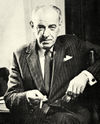Colonel Charles Russell
Authors [about]:
join in to develop this article! |
Colonel Charles Michael Russell, generally known as Colonel Russell, is a retired Anglo-Irish British army officer created by the British thriller writer William Haggard who, after World War II, becomes head of an unobtrusive but occasionally lethal British counter-intelligence agency called the Security Executive, where he moves easily and gracefully along C.P. Snow's Corridors of Power. The Executive figures in 25 novels featuring Russell and in several others in which Russell is not a character. Haggard himself, who had served at least for a while as an Intelligence Officer during the War, called it "not entirely imaginary". Russell is presented throughout the series as an "unapologetic" Establishment conservative but, perhaps because of his part-Irish heritage, is far from being a racist: in at least one of his books, he hopes that a Black "operator" of the Executive, William Wilberforce Smith, will become its head.
We learn in Slow Burner, the first Russell book, that he is somewhere in his fifties and unmarried. He is "not particularly tall" but "his stride was an inch or two longer than the average, an inch or two longer than an infantryman of the line would have felt comfortable". In spite of his age, his golf handicap is two, and he has fairly recently competed in the British Amateur golf championship. "As a younger man, he had [also] driven in competitions" and still drives fast but safely. He has "an abundant mustache"; drinks sherry or whisky and soda before lunch and might have some port before going to an important early afternoon meeting, but more to delay his arrival than because he wants or needs it. He smokes a pipe and an occasional cigar but by the 21st book he has given up smoking. "By the standards of conformity" his office furnishings and decorations are an eclectic mix, a "scandal". Perhaps because of his Army background, to help his thinking about a problem he writes an APPRECIATION of the situation in longhand, arranging everything into neat categories. His chief assistant, whom he trusts implicitly, is Major Robert Mortimer. But unusually for a senior official dealing frequently with other officials and their policies that impede his job, "malice or resentment were emotions unknown to him... he was aware that he had an excellent brain... lucid, even a little elegant. But [on this important occasion in Slow Burner] quite, quite wrong. And Mortimer had been entirely right... In his mental register [Russell] entered the matter as Lesson Learned; he entered it to the already formidable credit of Experience."[1] He belongs to Bratt's Club,to which John Beaver in Evelyn Waugh's A Handful of Dust, also belonged. It is a "decidedly uppity place" with old-fashioned customs, antique waiters, and no bar—for gentlemen don't drink at bars.
Sources
- Encyclopedia of Mystery and Detection, Chris Steinbrunner and Otto Penzler, McGraw-Hill Book Company, New York, 1976, ISBN 0-07-061121-1
- Twentieth Century Crime and Mystery Writers, edited by John M. Reilly, St. Martins Press, New York, 1980, ISBN 0-312-82417-3
- Who's Who in Spy Fiction, Donald McCormick, Sphere Books Limited, London, 1979
References
- ↑ Slow Burner, A Signet Book, the New American Library, New York, paperback edition, First Printing, October, 1965
